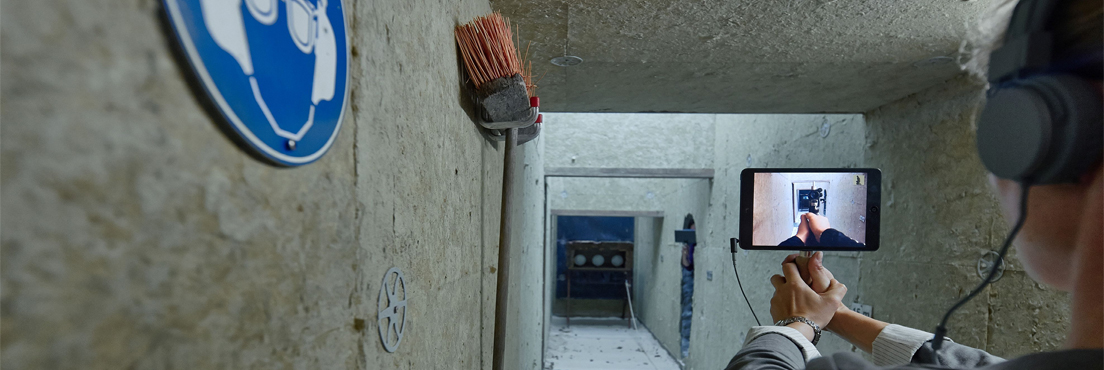Contemporary theatre programme forte forte. Rimini Protokoll. Situation Rooms

Rimini Protokoll (Haug / Kaegi / Wetzel)
SITUATION ROOMS
A multiplayer video piece
Rīgas Kinostudija, Šmerļa street 3
October 14th – 17th & 20th – 24th at 16:00, 18:00 and 20:00
October 18th – 19th and 25th – 26th at 12:00, 14:00, 16:00, 18:00 and 20:00
In Latvian, English, German or French
Duration 1h 30min
Each performance can be seen by 20 people
We ask you to be at the venue 15 minutes before the start of the performance
Sold out!
Authors: Helgard Haug, Stefan Kaegi, Daniel Wetzel
Scenography: Dominic Huber / blendwerk
Video: Chris Kondek
Sound: Frank Böhle
Technical Director / Light: Sven Nichterlein
Research: Cornelius Puschke, Malte Hildebrand
Director Assistance: Malte Hildebrand, Ann-Kathrin Büdenbender
Production Management: Heidrun Schlegel
Scenography Assistance: Claudia Bartel / Ute Freitag / Sophie Reinhard / Leonie Süess
Video Assistance: Philipp Hochleichter
Light: Hans Leser / Stefan Neumann
Elektronic Effects: Georg Werner
Production management Assistance: Caroline Lippert / Christin Prätor
Participants: Abu Abdu Al Homssi (Syria), Shahzad Akbar (Pakistan), Jan van Aken (Germany), Narendra Divekar (India), Nathan Fain (USA), Reto Hürlimann (Switzerland), Maurizio Gambarini (Germany), Andreas Geikowski (Germany), Marcel Gloor (Switzerland), Barbara Happe (Germany), Volker Herzog (Germany), Richard Khamis (South-Sudan), Wolfgang Ohlert (Germany), Irina Panibratowa (Russia), Ulrich Pfaff (Germany), Emmanuel Thaunay (France), Amir Yagel (Israel), Yaoundé Mulamba Nkita (Kongo), Familie R (Lybia), Alberto (Mexico) and Christopher Dell, Alexander Lurz, Karen Admiraal
A production of Rimini Apparat and Ruhrtriennale, in coproduction with Schauspielhaus Zürich, SPIELART festival & Münchner Kammerspiele, Perth International Arts Festival, Grande Halle et Parc de la Villette Paris, HAU – Hebbel am Ufer, Künstlerhaus Mousonturm Frankfurt am Main, Onassis Cultural Center-Athens.
Funded by the German Federal Cultural Foundation and the Regierende Bürgermeister of Berlin – Senate Chancellery – Cultural Affairs.
May 2011, a photo flashes onto screens around the world. It shows 13 people in a room. The expressions on their faces speak volumes: triumph, fascination, scorn, horror, scepticism, preoccupation. The photo from the White House “Situation Room” documents the end of a manhunt that was pursued with all possible weapons.
‘Situation Rooms’ gathers together from various continents 20 people whose biographies have been shaped by weapons in a film set that recreates the globalised world of pistols and rocket-propelled grenades, of assault rifles and drones, of rulers and refugees, becoming a parcours of unexpected neighbourhoods and intersections.
With the personal narratives of the ‘inhabitants’, the images start to move and the audience follows the individual trails of the cameras they have been given. They start to inhabit the building, while following what they see and hear on their equipment. The audience does not sit opposite the piece to watch and judge it from the outside; instead, the spectators ensnare themselves in a network of incidents, slipping into the perspectives of the protagonists, whose traces are followed by other spectators.
One spectator sits at the desk of a manager for defence systems. At the same time, another follows the film of a Pakistani lawyer representing victims of American drone attacks in a cramped room with surveillance monitors. On her way there, she sees a third spectator who follows his film into the shooting range of a Berlin gun club, listening Germany’s parcours shooting champion. Around the corner stands another spectator in the role of a doctor carrying out amputations in Sierra Leone, while in the room next door a press photographer sorts pictures of German army missions in Afghanistan, only to stand in the shooting range himself a little later to do exactly what he was able to observe in passing just a while ago, thereby becoming a subject for observation himself. The audience gradually becomes entangled in the film set’s spatial and material labyrinth; each individual becoming part of the re-enactment of a complicatedly elaborated multi-perspective “shooting”.
“Situation Rooms” was awarded with the Children’s Choice Award from the Ruhrtriennale 2013 in the following categories: “Best of the Best” and “Most intense show that was so intense that I didn’t want to miss a second”.
In addition, Rimini Protokoll received the Excellence Award of the 17th Japanese Media Arts Festival on 05th February 2014 in Tokyo.
Contemporary theatre programme forte forte is the event of Riga 2014 – European Capital of Culture supported by foundation “Riga 2014”, Riga City Council, Ministry of Culture, State Culture Capital Foundation, Latvia’s State Forests, Goethe Institut Riga.
Back
